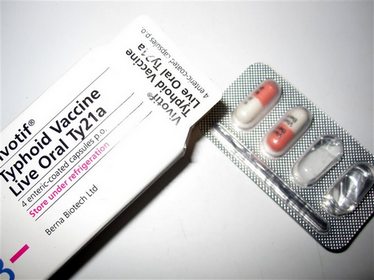Typhoid vaccine
What is typhoid fever?
Typhoid fever is a serious and potentially deadly disease, caused by a bacterium Salmonella typhi, which is often found in wastewater.
Typhoid fever can be prevented a vaccine. Although a vaccine effective against typhoid type, it can not for 100% prevent infection.
Typhoid fever is common in developing countries, where the water may be contaminated with bacteria. It is therefore important, especially during a trip to Asia, Africa and Latin America to be aware of possible bacteria contamination of food and water.
Typhoid fever is spread through drinking water, which has been contaminated by sewage. It may also enter the body through food, who were contact with contaminated water.
The most common symptoms of typhoid include:
- Heat, typically up to 39,5 ˚C – 40 ˚C;
- Weakness;
- Fatigue;
- Stomach pain;
- Loss of appetite;
- Headache.
In patients with typhoid fever, usually, there is persistent fever. Many patients also manifested rash, that looks like a flat, pink spots.
If typhoid fever was detected in time, He successfully treated with antibiotics. Without treatment, fever and symptoms may continue for weeks or months, and death can occur as a result of complications from the bacterial infection.
With antibiotic treatment, symptoms usually begin to subside within two or three days. Reduction in symptoms does not mean the absence of bacteria in the blood. It is important to take the full course of antibiotics as prescribed by your doctor and carefully, and wash hands frequently. Keep in mind, that typhoid can easily spread to others.
What is the vaccine against typhoid fever?
There are two types of typhoid vaccine:
- Inactivated (ubitaâ) vaccine, which is administered by injection;
- Live attenuated (weakened) vaccine – It is taken orally.
Typhoid vaccine may be given in combination with other vaccines, but it is not part of combination vaccines.
Both types of vaccines should be stored in a cool place, at a temperature below 15 ˚C, but they should not be frozen.

Inactivated vaccine is administered via injection. It should not be given to children under two years old. Vaccination should be carried out not less than 14 days before traveling abroad. Catch-up dose is necessary every two years to individuals, which continue to be in the region, where they would be at risk of contracting typhoid fever.
Live typhoid vaccine is administered orally, and should not be given to children under six years. Four doses are needed, with an interval of two days between doses. Every five years, it is necessary to carry out catch-up vaccination.
Who and when to be vaccinated against typhoid fever?
Despite, that vaccination against typhoid fever is not is not mandatory, should be vaccinated individuals following groups:
- Person, which are sent to areas, where typhoid fever is common;
- Person, which are in close contact with a man, who is sick with typhoid fever;
- Person, who work with the bacteria of typhoid – usually, laboratory workers.
An extra dose of inactive vaccine is needed every two years for those, at risk of contracting typhoid fever, and every five years for those at risk, who take the oral vaccine.
For maximum effectiveness, vaccination should be carried out for 2-3 weeks prior to the potential impact of typhoid.
Risks, associated with the vaccine against typhoid fever
The most common side effects include:
- Fever;
- Headache;
- Redness or swelling at the injection site.
Less common side effects include:
- Abdominal pain;
- Nausea and vomiting;
- Rash.
Side effects, which may indicate a serious allergic reaction include:
- Changes in behavior;
- Extremely high temperatures;
- Labored breathing, hoarse voice or wheezing;
- Hives;
- Pale skin;
- Weakness;
- Cardiopalmus;
- Dizziness.
Who should not be vaccinated against typhoid fever?
- We should not get vaccinated by injection following groups:
- Person, who have had severe allergic reactions to previous vaccines;
- Children under 2 years;
- We should not get vaccinated following oral vaccine group:
- Person, who have had severe allergic reactions to previous vaccines;
- Children under the age of 6 years;
- Person, taking some groups of antibiotics;
- Persons weakened immune system, including patients HIV / AIDS;
- Persons taking medications, which can suppress the immune system (eg, steroids);
- Cancer patients;
- Person, who are being treated for cancer with chemotherapy or planning a X-rays.
Talk to your doctor, if you go on a trip, or are in the area of possible contamination with typhoid, especially if you have any of these diseases.
What other ways besides vaccination can prevent typhoid fever?
Here are some ways to reduce the risk of contracting typhoid fever:
- Frequent and thorough hand washing, particularly before contact with food;
- Proper cleaning and cooking, to prevent contamination of the products;
- It is not recommended to eat raw vegetables or fruits, that can not be peeled;
- Boiling water before drinking or using;
- It is necessary to avoid potentially contaminated food or water.
What happens in the event of an outbreak of typhoid fever?
If the suspected cause comes from the catering facilities, facility and employees should be investigated within 24 hours, to determine the source of the spread of typhoid suspect.
If the suspect source – Child care facility, facility and employees should be investigated and questioned about recent travel and symptoms of malaise;
Besides, in the event of an outbreak, State institutions should inform the public about how to prevent the transmission of typhoid fever, including good hygiene and thorough cooking.
